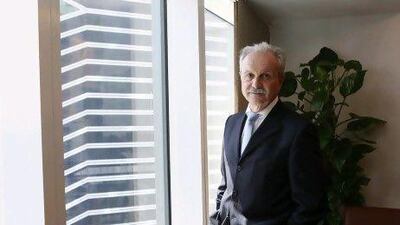Jean-Pierre Roth is a central figure in Swiss business and economics.
He was the chairman of the country's central bank before he retired two years ago.
He now sits on the boards of Swatch, the world's biggest watch maker, Nestle, the world's biggest food manufacturer, and Swiss Re, the world's second-largest reinsurance company.
Here he talks to The National's Asa Fitch about Europe's crisis - and how Switzerland is being affected - while on a visit to Dubai to celebrate Banque Cantonale de Genève's first anniversary in the emirate.
Mr Roth is also chairman of the Swiss bank.
The economic clouds over Europe are looking darker by the day. Have European leaders made any real progress in solving the debt crisis?
They are making progress because the [European] government fully realises how severe the situation is. But they have to come up with extremely unpleasant and unpopular decisions. The major challenge for most European countries is fiscal consolidation. They came into the financial crisis with a lack of discipline, and they had to widen the deficit during the crisis to support demand and the global economy.
How do you think the so-called troika of the IMF, EU and European Central Bank is doing?
There was the usual discussion of whether the IMF should step in or not. I find it very positive to see the IMF being involved because you bring in a second opinion. One problem of Europe is that they decide everything around the table, and these are nice politicians, they have a lot of respect for each other and maybe they do not have the brutality they need.
What is missing in Europe is market brutality. That was missing for Greece, that was missing maybe for other countries. In the past with the national currency, if the government were implementing imprudent policy, the market would immediately sanction that with an attack against the currency. With the euro, they were able to implement policy without any market sanction.
Where does Switzerland fit in this equation? It isn't part of the euro zone, but many of its exports go to Europe and investors have been buying Swiss assets lately as a haven, which prompted the central bank to put in an exchange-rate floor with the euro.
Switzerland has excellent cards and a difficult situation. Excellent cards [in that] the Swiss economy is extraordinarily diversified in product and extraordinarily diversified in markets. The trade of Switzerland with emerging markets is much larger than what you find normally in Europe because of the presence of the export sector.
Extremely diversified in product because we are good in chemicals, we are good in pharmaceuticals, in banking, in investment goods, even watches, not to [mention] the food and chocolate industry.
We had the financial markets develop and this of course is extremely difficult. I am fully confident that the Swiss private sector will adjust to that. It's extremely painful in the short term, but history has shown that the private sector is strong enough and Switzerland is ready to accept the consequences of restructuring, transferring activity abroad if needed.
But can Swiss exporters adjust to a stronger franc if instability in Europe persists?
They have to. It's not a question of whether they can or not. They have to, and they will.
You push as far as possible the quality of your product, the technology content of your product, if needed you transfer activity abroad, you specialise in the value chain the part you can do well.
Switzerland has had the tradition of a strong currency. This is not new. It started already in the 1970s. You come up now with a country with a much higher export sector than most European countries, stronger presence in the global economy and the lowest rate of unemployment in Europe.
So the private sector is strong enough to adjust.
But how long will these difficulties in Europe last?
I am sure that volatility, uncertainty will continue. We are at the end of an episode of relatively high stability. The development of the western economy since [the Second World War] has been moving in one direction, and [now] it has come to a break. We are at the end of this chapter, which was opened after the Second World War, where the allies defined the new rules of the world economy: free trade; financial stability; exchange stability; fiscal discipline.
The fact is that unfortunately the advanced economies were the first ones to violate those rules. We are entering now a new phase, maybe with new rules, and we don't know which rules will be implemented, which rules will be defined. Who is going to introduce those rules? In the past we had the United States dominating the world scene. Now we have a multi-polar world with Europe, a weakened US, China, India, Latin America, so the world is much more complex. My expectation is we are now entering a phase of I think large uncertainty, and it can last a decade.
Surely a decade-long period of instability in Europe would not be good for Switzerland?
The advantage of Switzerland is to be a small element agile enough to adjust to a changing system. We are ready to accept and have the necessary agility, flexibility to adjust, because we know we have to adjust, we have no other option.

